Open innovation which is quite a new definition in Southeast Asia and Vietnam in particular, provides both opportunities and challenges. Startups cannot overcome challenges and then obtain opportunities, while corporates urge for reforms and exposure to new business elements. Does “open innovation” relationships impact to both parties?
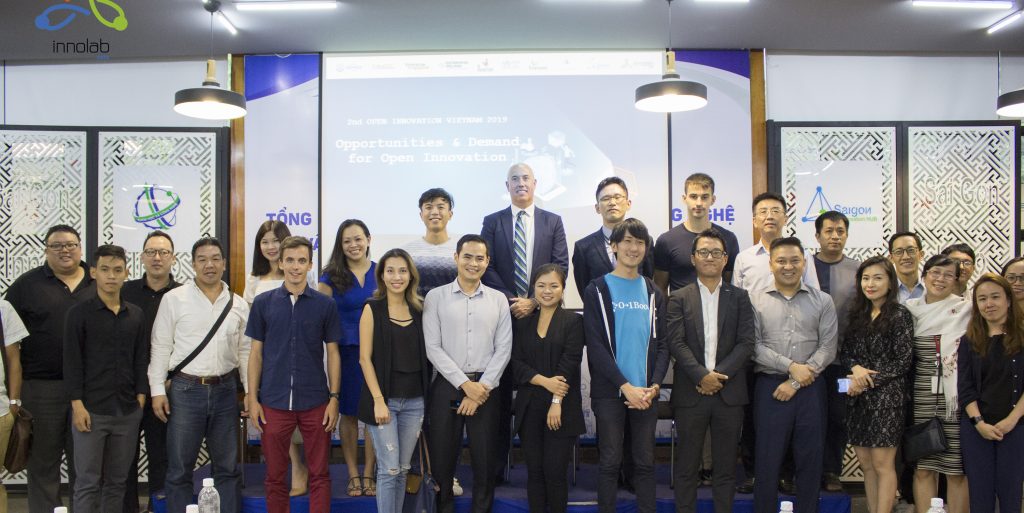
Over 50 experts and startups in Vietnam as well as other countries had attended to “The 2nd Open Innovation” hosted by Innovation Lab on May 22nd, 2019. As open innovation allows startups to market their internal resources and have a wider network in which to co-create and leverage their fresh expertise, the “Open Innovation” emphasizes on the importance of collaboration with big corporates to generate their business and embrace competition.
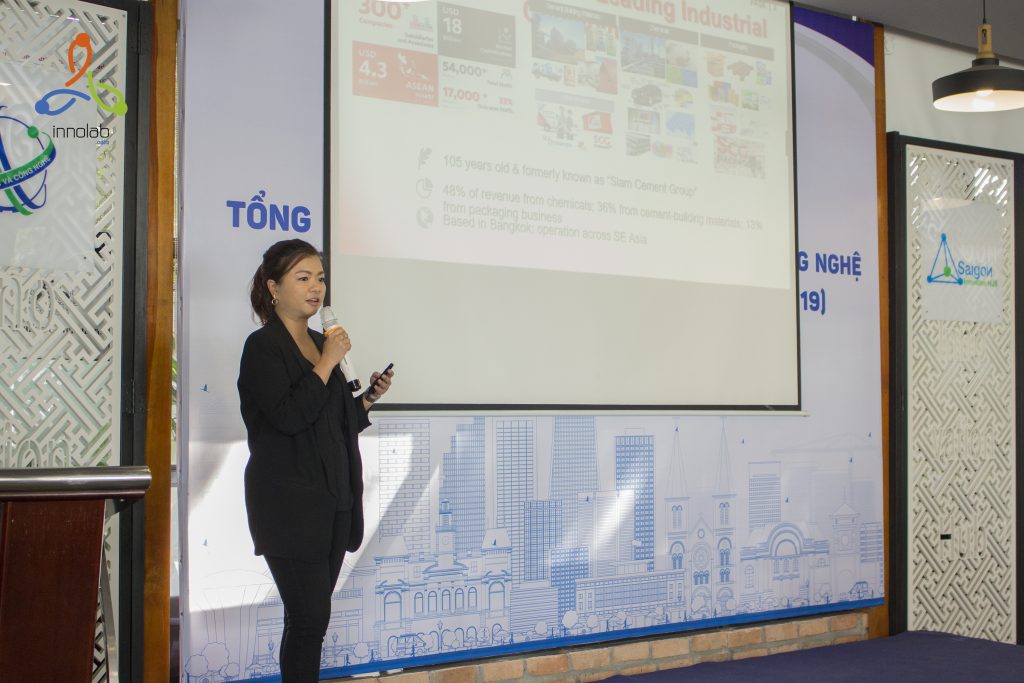
Ms. Jane Sajeekarn Prescott – Assistant Manager of AddVentures by SCG (Siam Cement Group)
Ms. Jane Sajeekarn Prescott – Assistant Manager of AddVentures by SCG (Siam Cement Group), a 105-year-old Bangkok-based company operating across ASEAN, explained its function as collaborating with other corporations running business with SCG.
In SCG, they also have Corporate Innovation Office which generates Non-digital Technologies and Digital Technologies for internal and external projects.
Through these collaborations, SCG can take advantage of their strength to support their partners in Thailand market. Conversely, SCG’s partners back them on studying about targeted market which facilitates SCG to enter new market after be at forefront of Southeast market.
Jane insisted on the contribution of startups to innovation that creates new solutions for existing situations of every company and SCG in particular. Besides, by nurturing innovative ideas from their employees, they also build a long-term commercial relationship with potential external startups with providing funding, mentoring, business networks, etc.
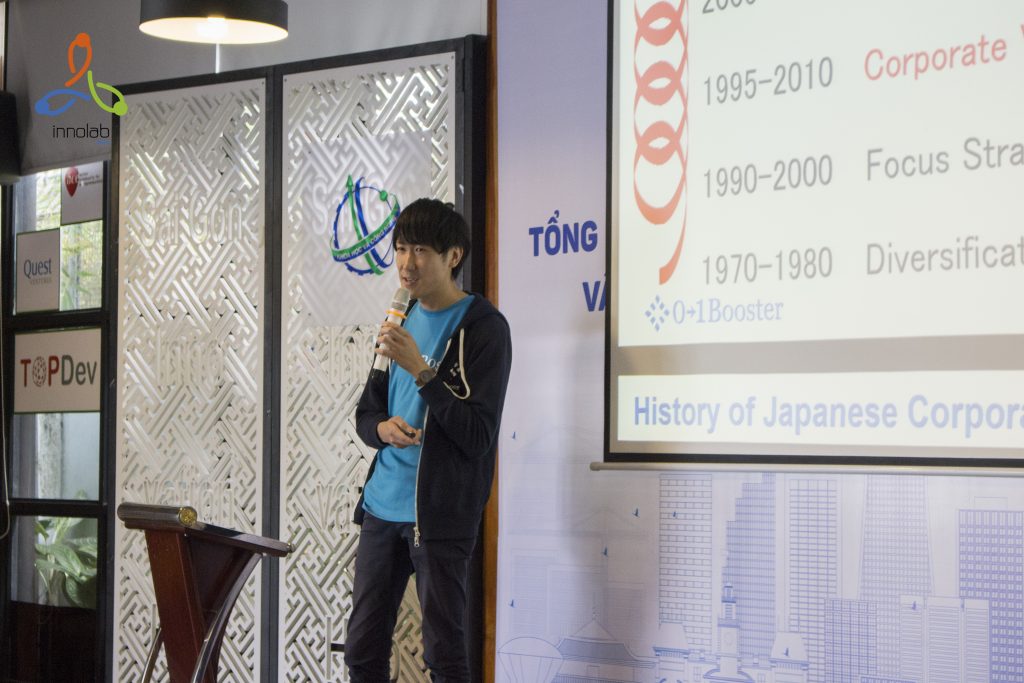
Mr. Takeru Kawashima – Director of 01booster Accelerator from Japan
Following was “Corporate Accelerator as open innovation vehicles landscape in Japan”, the presentation of Mr. Takeru Kawashima – Director of 01booster Accelerator from Japan, giving attendees many interesting information by comparing open innovation in the past and recent years in Japan.
Starting his presentation by looking back in 2017 with only one unicorn (startup company valued at over $1 billion) in Japan whereas the US or China had a lot of potential unicorns.
Few years before 2017, “Entrepreneurship crisis” took place in Japan which witnessed a downward trend in GDP as well as in Venture Capital (VC Funding) of Japan.
In recent years, however, the situation is changing in positive way. The venture capital funding has increased dramatically since 2017. Besides, startups also have support regularly from Japanese Government which has been a motivation for startups and small firms to be more creative and be ready to scale up in the near future.
His remarkable sharing was about corporate engagement in startup ecosystem. According to Recof Co, 1.3 billion USD of Venture investment came from Corporate in 2018 (more than ¼ of total venture investment in Japan and 91% increase comparing to 2017). Besides, expanding of startup engagement from Corporate and Corporate Accelerators are the noticeable signs which create ideal environment for small, early-stage, and emerging firms to innovate.
After that, the final panel discussion on “Opportunities and Demands of Open Innovation” created spaces for experts and executives talking about reality case studies in their company and Southeast market.
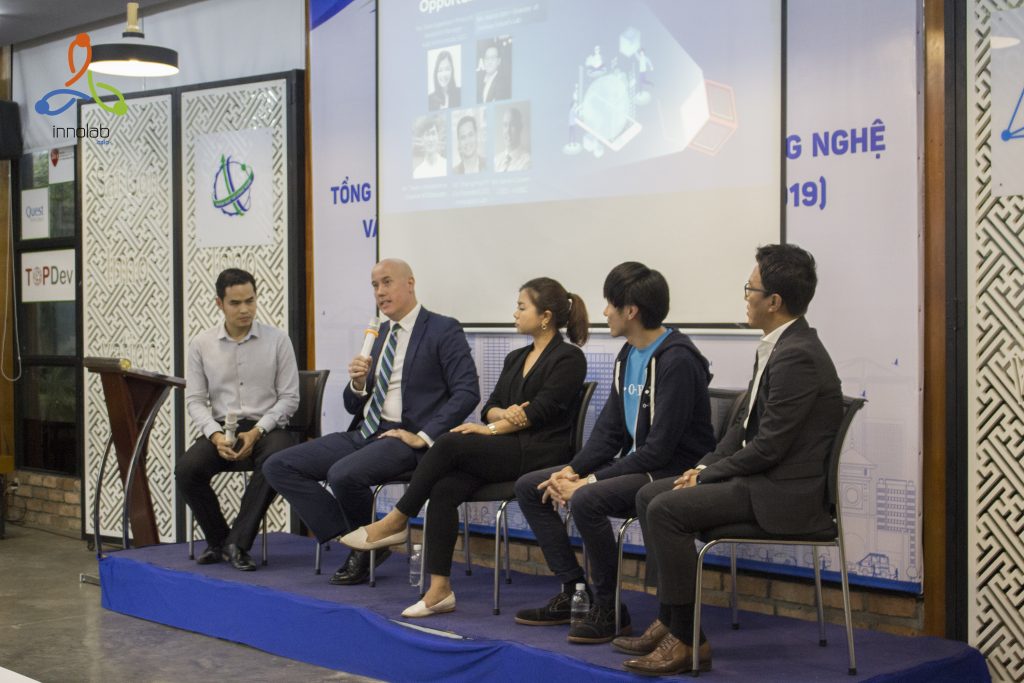
With the question from Mr. Thang Huynh – Co-Founder of Innovation Lab, Moderator of the panel, about How a big corporate builds open innovation, Ms. Jane Sajeekarn Prescott – Assistant Manager, Add Ventures by SCG, shared that although big corporation like SCG have many difficulties when collaborate with external startups about strategy, vision or technology, they are willing to find and guide startups because these startups have apparent views about markets which help SCG to access abilities out there.
More about banking field, to have a development in innovation in recent years, HSBC used to face with many challenges, Mr. Kevin Green – Chief Risk Officer of HSBC emphasized that HSBC has thought about innovation 3 years ago to innovate fintech field with a lot of ideas and technologies. HSBC has spent US$2 billion for digital transformation until 2020 to invest on accounting, logistic or blockchain to learn more about incredible customer journey to optimize their experience. He also shared challenges in the past which they were scared of failing because they thought the effective results would take a long time to be tested. Now, they are aware of importance of innovation, they prefer test to learn, and when internal apartments have new ideas, HSBC has encouraged them in speaking out and then they start to test these ideas together.
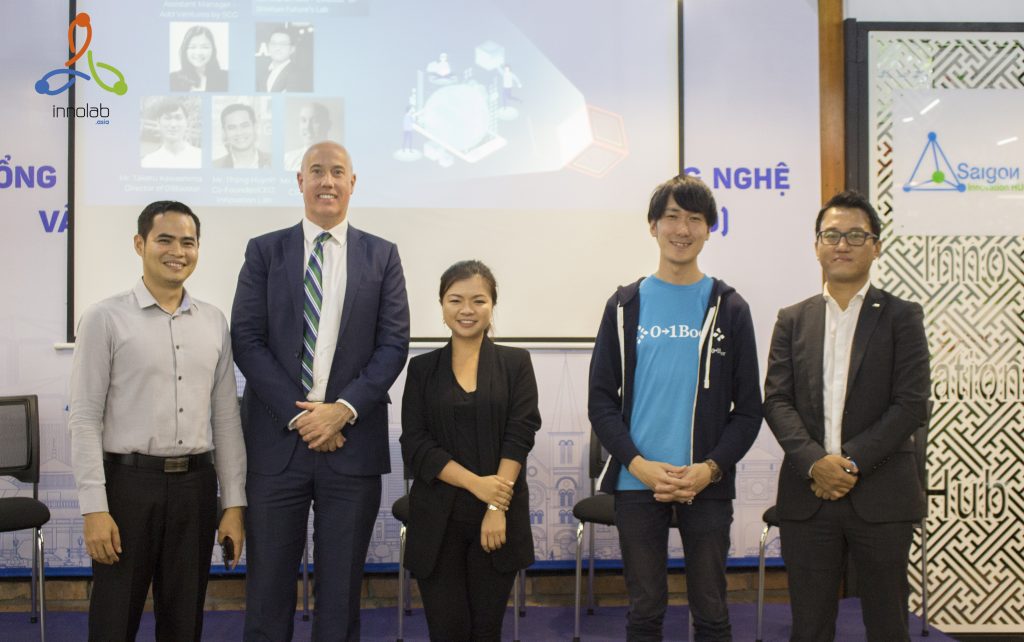
Mr. Thang said Japan had a long tradition which was one of challenges of Japaneses in innovation and he asked Mr. Takeru what actually cultural challenges in innovation and what have companies should do to corporate in cross-culture?
Mr. Takeru Kawashima – Director of 01Booster shared that culture is one of big barriers in business in Japan. Nowaday, Japan has a lot of new companies which were introduced 2 or 3 years ago, but they are covered by Japanese tradition like doing the same thing or reaching KIPs and then having no attention to other things. He found it very hard to try something new. In recent years, by cross-culture corporation, Japanese has tried to open their mind to listen and be ready to learn something new, but when they work in multinational environments, many people who come from other countries still misunderstand about employees in Japan like a corporate guy is always under a lot of rules, etc.
Mr. Takeru emphasized that communication is one of effective ways when collaborating in cross-culture environment.
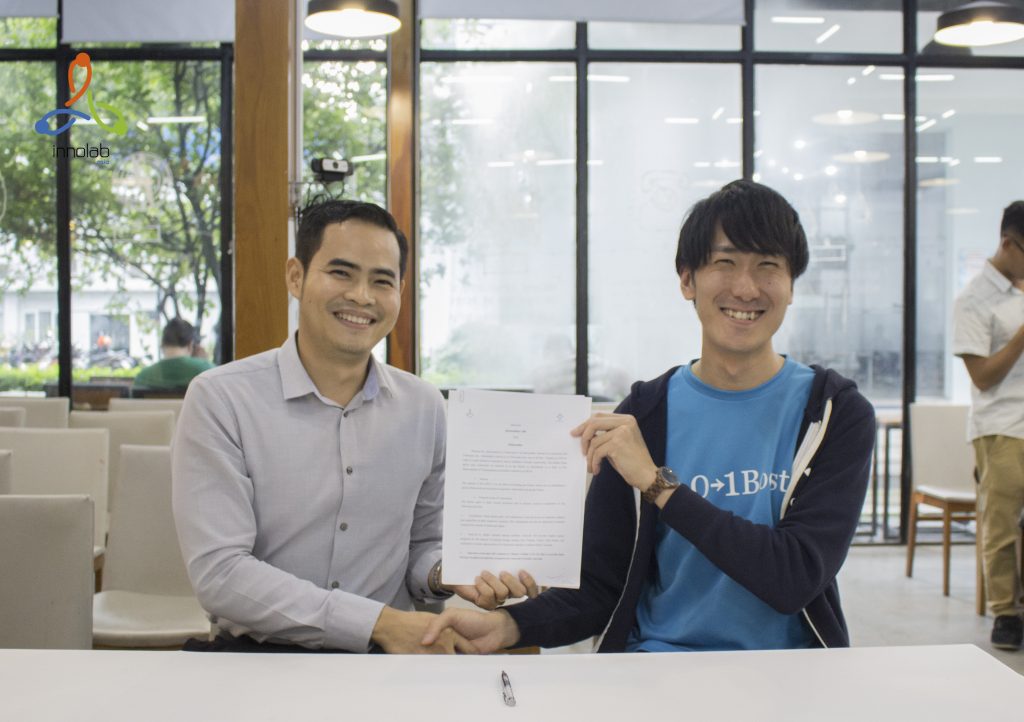
MOU Signing between Innovation Lab and 01Booster.
Mr. Huynh Cong Thang gave Mr. Martin – Director of Sinhan Future’ lab a question about benefits and impacts of collaboration between big corporates and startups. Mr. Martin shared that most of collaborations are between financial corporate and startups because financial corporates provide solutions for banking systems which are weakness and problem of most startups nowaday.
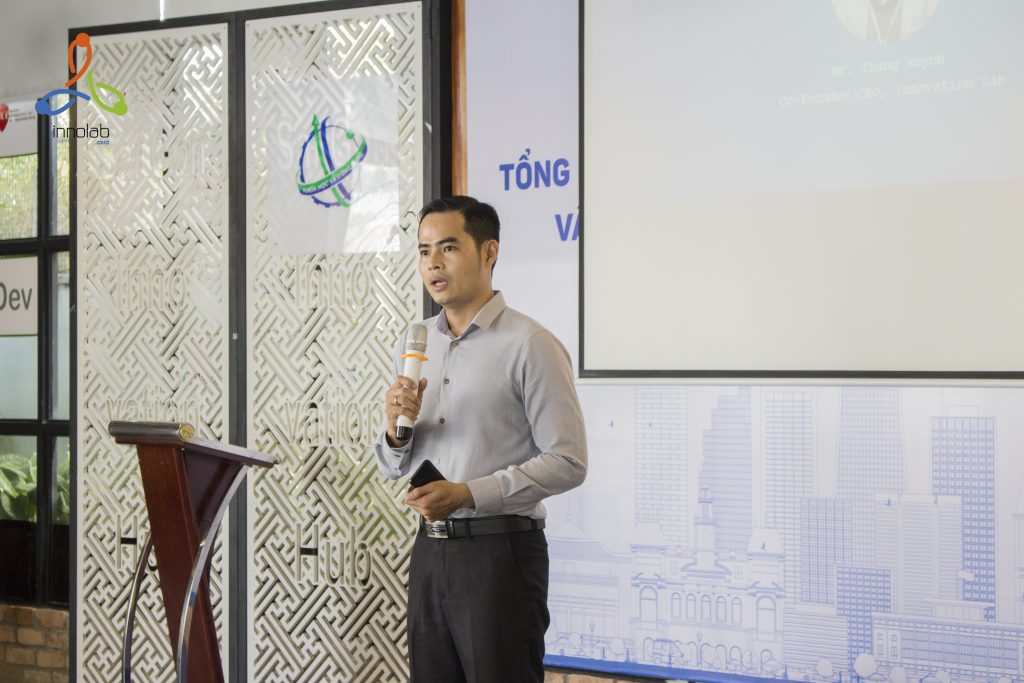
Mr. Thang Huynh – Co-Founder of Innovation Lab, Moderator of the panel
Furthermore, banks and financial institutions are going to modify solutions to enlarge market and give startups advice to apply them into their platform. Mr. Martin encourages young startups to speak out their problems and expectations when they collaborate with big corporates, corporates will look back to startup’ s potential resources and they then support with suitable solutions.
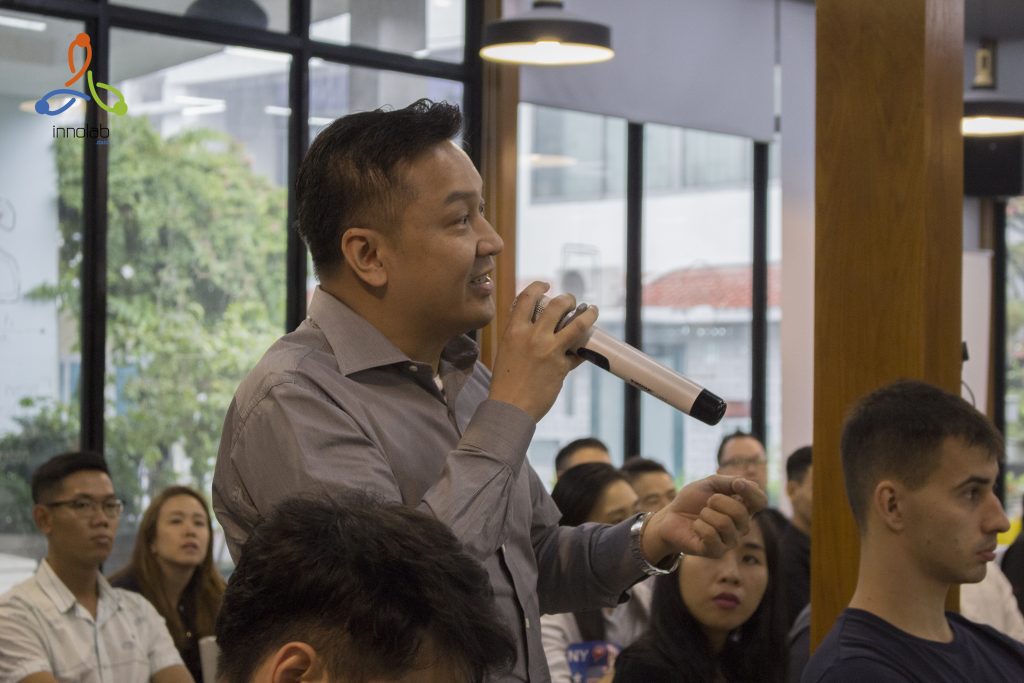
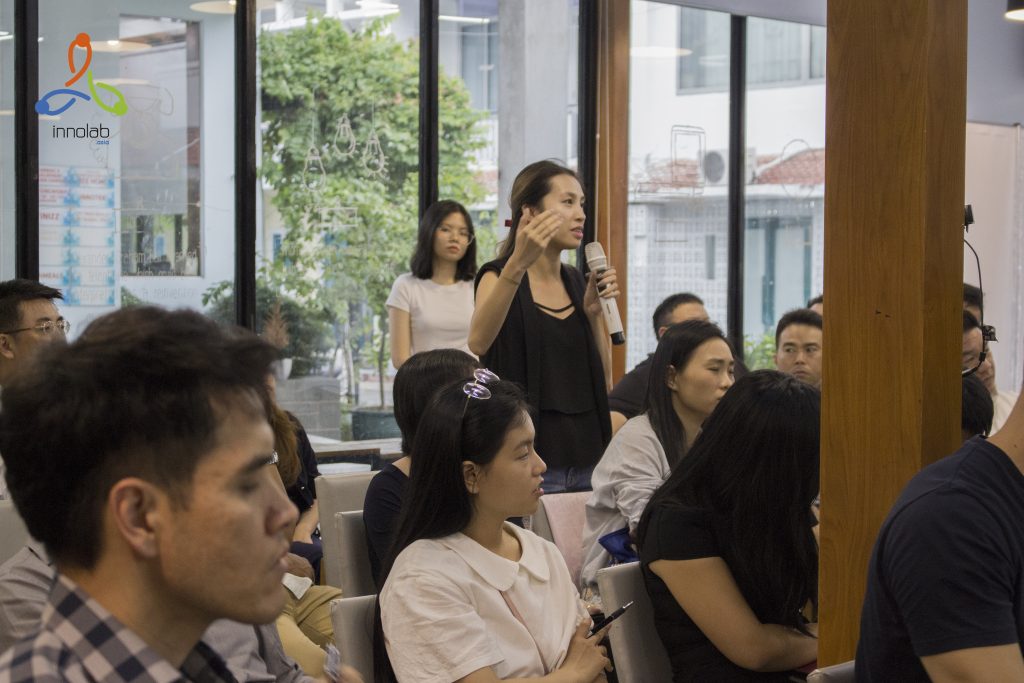
Innovation Lab’s vision is to create an innovative collaboration platform where all stakeholders in the innovation ecosystem meet, collaborate and succeed together.
Our upcoming event: CrowdPitch Vietnam 2019
Please kindly follow us to update more upcoming programs: https://innolab.asia/


